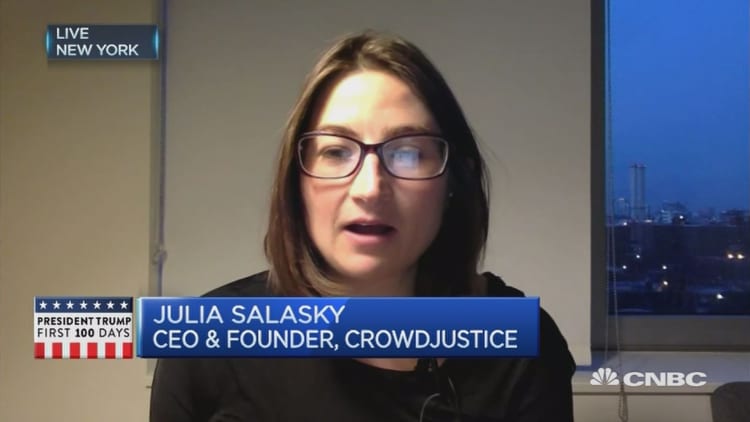Asian markets were mostly higher on Monday, as investors try to make sense of U.S. President Donald Trump's policy noise.
Since Trump's inauguration on Jan. 20, there has been a flurry of actions that run the gamut from immigration to financial deregulation to tighter border control.
Amid increased uncertainty, the market is caught between a situation of "Trump-flation", that is higher yields and stronger dollar, or "Donald Doubt," which sees a softer dollar and lower yields due to protectionism and dollar jaw-boning, said Mizuho Bank's Vishnu Varathan in a Monday note.
The remained below the 100 handle, to trade at 99.804 during Asian time against a basket of currencies. The dollar has been flailing ever since the Trump administration made its preference known for a weaker dollar.
"Fading Trump-phoria and rising policy execution doubts, on top of activity improvement globally, drive U.S. dollar lower in the interim," Varathan said.
The greenback also continued to slip against the yen, at 112.5 as the Australian dollar held steady at $0.7666.
Mainland Chinese markets ended in positive territory, with was up 0.55 percent or 17.2 points at 3,157.37 and Shenzhen composite gained 0.931 percent or 17.7 points to close at 1,927.57. Hong Kong's gained 0.71 percent.
Earlier, China's Caixin January services purchasing managers' index (PMI) came in at 53.1, weaker than December's 53.4. Despite a slower pace of expansion, China's services sector remained strong with companies seeing a solid increase in orders, Reuters reported.
In Australia, the S&P/ASX 200 index closed down 0.11 percent or 6 points at 5,615.6. Government data showed that December retail sales fell 0.1 percent from the previous month, compared to a Reuters poll forecasting growth of 0.3 percent.
The National Australia Bank, one of Australia's "Big Four" banks, saw shares jump 0.76 percent to A$30.62 a share, after it reported a 1 percent decline in its first-quarter cash profit at A$1.6 billion ($1.23 billion), as costs overtook revenue.
Markets in New Zealand will be shut for a bank holiday.
Japan's was up 0.31 percent or 58.5 points at 18,976.71 after official data showed that wages in Japan fell in December, on an annual inflation-adjusted basis, for the first time in a year.
Officials said that the decline was caused by a rise in the cost of living, which outpaced nominal pay hikes, Reuters reported.
Across the Korean strait, the Kospi finished up 0.22 percent or 4.5 points at 2,077.66.

Markets are also watching geopolitical strain in the east Asian region, with U.S. Defense Secretary James Mattis' visit to South Korea and Japan late last week. Mattis emphasized the U.S.'s commitment to defend Japanese territory, including the cluster of islands that China claims.
China has hit back at Mattis' remarks, warning the U.S. not to infringe on China's claim of sovereignty over the islands known as Senkaku in Japan and Diaoyu in China.
At the weekend, U.S. President Donald Trump's immigration ban on travelers from seven Muslim-majority countries and indefinite block on refugees faced legal setbacks as a federal judge blocked the move with a temporary restraining order on Friday.
A U.S. appeals court denied an emergency appeal from the U.S. Department of Justice to restore the immigration order on Saturday, Trump continued his barrage of Tweet attacks on the federal judge, U.S. District Judge James Robart and the court system.
Trump faced strong global backlash after the immigration ban, which is seen by several as discriminatory towards Muslims.

Led by a strong performance in financials, the was up 0.94 percent last Friday, its best trading day for 2017, at 20.071.46, as the S&P 500 rose 0.73 percent to close at 2,297. The added 0.54 percent at 5,666.8.
The U.S. financials play was "driven by President Trump's order to investigate potential easing of bank regulation and changes to the Dodd-Frank," said Ric Spooner, chief market analyst at CMC Markets, referring to the financial reform legislation passed by the Obama administration in 2010 as a response to the 2008 Great Financial Crisis.
The January nonfarm payrolls report showed a smaller-than-expected rise in wages despite the impressive jobs gain, suggesting that the slack in the labor market might keep U.S. inflation in check.
The energy markets are likely to be focused on the rising tensions between Iran and the U.S., after Washington rolled out new sanctions on Iran for their ballistic missile tests. The latest move will not undo Iran's historic nuclear deal, although there are risks that the accord could unravel.
The U.S. oil rig count also rose to its highest since October 2015, Baker Hughes data showed last week, adding to concerns about the oil market supply rebalance.
Global benchmark Brent crude were up 0.3 percent at $56.98 per barrel during Asian trade, while Nymex WTI crude added 0.32 percent to $54.00.

